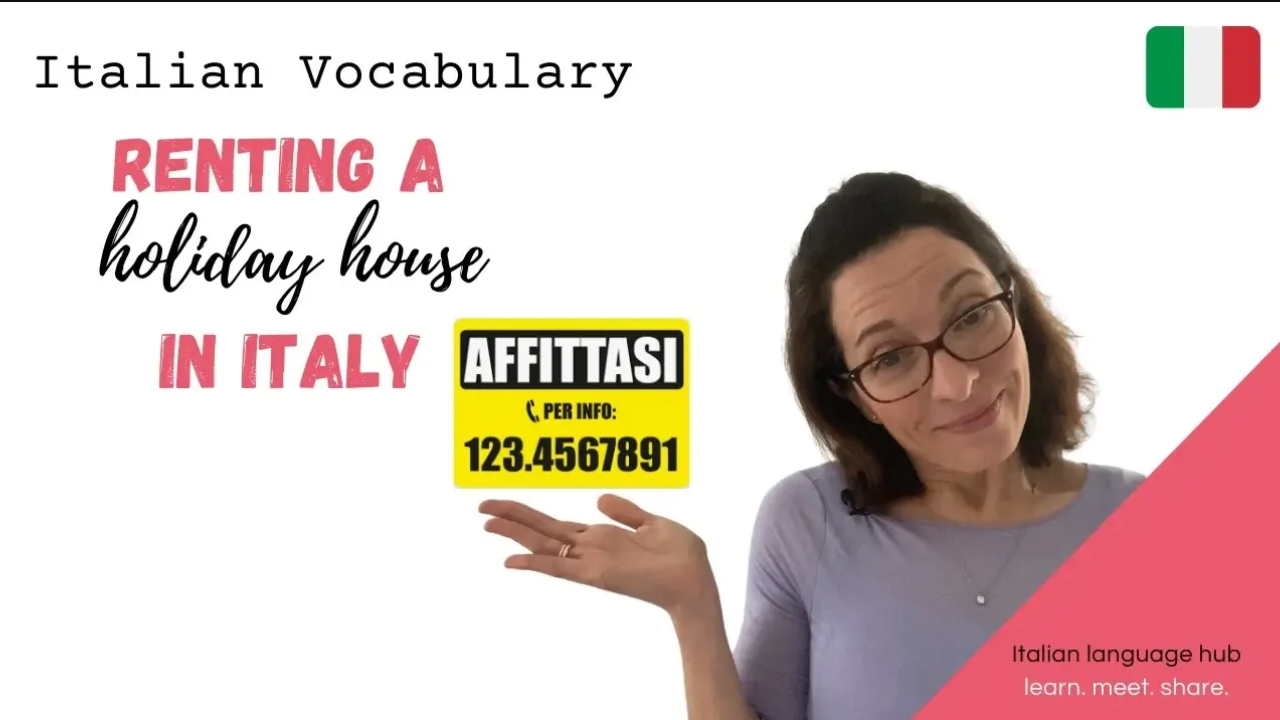Italianize Yourself
Full immersion on all that's Italian.
Fun Facts. Italian Culture. Language Insights.
The Italian Expression "TI VA?"
Ever heard an Italian say "TI VA?"
"Ti va" is a super common and very colloquial Italian expression that can translate to “do feel like …? or do you want… in English.
Download for free the lesson in PDF format here!
So you can use it if you want to ask a person if they want or feel like doing something with you.
For example:
- Ti va di venire a cena da me stasera? – Do you want to come over for dinner tonight?
- Ti va di prendere ascoltare un po’ di musica? – Do you feel like listening to some music?
In order to create this expression you will need to use the verb “andare” (to go), this verb is conjugated in the third person singular so you will use the form VA.
You will use TI if you are addressing the second person singular but you can use any subject.
For example if you ask me
- Ti va di fare una passeggiata? - Do you feel like going for a walk?
I can answer
- Sì, mi va! no, non mi va - Yes, I feel like going for a walk, no I don’t feel like going for a walk.
A...
How to use the Italian verb 'MANCARE'
A super useful and common verb in Italian is MANCARE. A verb with many different meanings.
Download for free the PDF of this lesson here!
The most common one is the translation of MANCARE with the English verb TO MISS.
How would you say I miss you in Italian?
- manco tu?
- manchi me?
- manca me?
The answer is MI MANCHI and YES you do have to use a horrible indirect pronoun before the verb! I will first explain this meaning and then add different meanings later on. The verb mancare is similar to the verb piacere. Both of these verbs have an irregular conjugation and they are called impersonal verbs. This means that you will need to remember to use indirect object pronouns in the third person singular and plural.
Check out this chart:

This is the formula that you need to remember:
- Mi manca + singular noun / verb (in the infinitive form)
- Mi mancano + plural noun
So how can you translate the following sentence: Examples:
- Mi manca la mamma → I miss mom
- Ti manca la Fr...
How to say the days and months in Italian
Let’s learn the days of the week and the months in Italian. We will try to use them in everyday language to get you to say your first Italian sentences correctly!
Want to print out this lesson in PDF? Click here to download it for free!
I giorni della settimana: the days of the week:
- lunedì (Monday)
- martedì (Tuesday)
- mercoledì (Wednesday)
- giovedì (Thursday)
- venerdì (Friday)
- sabato (Saturday)
- domenica (Sunday)
You will notice immediately two things!
- lunedì all the way to venerdì all end with a I that has a little accent on it. Please remember to say that accent and put a stress on that last syllable.
- the other difference is that unlike in the English language you will NOT need to use a capital letter when you write the names of the week.
In English if you need to talk about a recurring event that happens every Monday you will simply say on Monday, so you will make Monday plural. Take note that in Italian you will never have a plural version of the words lunedì,...
How to use CE L'HO in Italian
What does CE L’HO mean??? “Ce l’ho” translates to “I have it.”
Download the full lesson in PDF format here!
If somebody asks you do you have a pen… and you have it you can say
- Hai una penna! (Do you have a pen?)
- sì! Ce l’ho! (Yes, I have it!)
If you do not have a pen you will reply in the negative form NO, non ce l’ho! (No, I don't have it!)
CE doesn’t really have a particular grammar purpose. It is used to help with saying the sounds in a smooth way. So my suggestion here is to remember the full sentence
CE L’HO / NON CE l’ho!
So when the verb AVERE has before it a direct object pronoun (lo, la li, le) you will use the sentence CE l’ho / non ce l’ho to say that you have something or not.
- Hai un gatto? – Do you have a cat?
- sì, Ce l’ho – Yes, I have it
- Non ce l’ho – No, I don’t have it
Remember that HO is the verb avere. In these examples I used only the first person but you can use the CE before all the different conjugations singular, plural and so on… for ex...
Using Italian Adjectives Inside of a Sentence
What is an adjective?
It’s a word that you can use to describe a person or a thing.
For example, bello beautiful, brutto (ugly), grande (big) - piccolo (small), big, intelligente (smart), stupido (stupid)… colors can also be adjectives…. rosso (red), giallo (yellow), blu (blue) and so on.
Download all this information in PDF here!
In English if you are describing me you would say: Giulia has brown hair.
So your adjective will go before the noun - The adjective is brown and the noun is hair.
In this sentence you are describing what my hair looks like.
In Italian, on the other hand the adjective USUALLY goes after the noun. Take the same sentence that I used before… let’s translate it in Italian:
Giulia has brown hair = Giulia ha i capelli marroni.
As you can see FIRST I used the noun CAPELLI then after the noun I placed the adjective, in this case the color MARRONI.
Let’s look at some other examples:
- La macchina blu
- Il fiore giallo
- Il ragazzo alto
- I bambini picco...
Renting a house in Italy - Italian useful vocabulary

Are you interested in visiting Italy and you would like to rent an apartment for a longer stay? Well why not right? If you don’t want the hotel experience than renting a summer house is a perfect way to mingle with the locals and immerse yourself in a real Italian holiday experience.
In this video I will teach you useful vocabulary words and sentences that you can use when you are renting an apartment or simply if you are expanding your Italian vocabulary on houses in general!
Download all this information for free here!
Renting an apartment in Italy might not always be the easiest thing to do especially if you are visiting super popular tourist destinations or if you are coming in the Italian holiday season… for example august…where ALL Italians are on holiday. So definitely book in advance!
Where to look? Well usually I go on booking or if you live in Italy already you can go directly to a real estate agency or in the most touristic places if you wonder around the town you wi...
Da quanto
In Italian you will be using the term “da quanto” (how long) quite often. This video and article will show you how you practice and use this word in day-to-day speaking.
You will also find a link to a page where you can download a helpful PDF, so you can practice on your own.
You may be trying to ask a friend how long it will take them to get to your house, or maybe you're trying to ask a waiter how long it will take for your food to arrive.
Whatever the situation, learn to say HOW LONG with this video!
Download the FREE PDF of this lesson here!
In this lesson we will learn to say HOW LONG somebody has been doing something and we will use the words DA QUANTO.
So the formula that you need to study is for this lesson is:
da quando / da quanto tempo + present tense + rest of the sentence
Asking
So if you are living in Italian and somebody asks you “how long have you lived in Italy?” what will they say? well let’s use the formula:
Da quanto vivi in Italia? Da quanto tempo ...
How to use Niente, Nessuno and Nulla in Italian
Are you struggling to understand the difference between nessuno, niente and nulla in Italian? If so, you're not alone! Many Italian learners find these three words confusing and difficult to use correctly. Take the guesswork out of learning these words with my new video!
Click here to download all this information in PDF... for free!
Nessuno/Nessuna/Nessun = can (but not always) be translated to the english not / any.
Let’s look carefully at nessuno
Nessuno can be used both as an adjective and as a pronoun .
When it is used as an adjective, nessuno will be placed before the noun and it will be translated to ANY in negative sentences in English.
For example:
- Non ho nessun amico – I don’t have any friend
- Non hai nessuna riunione oggi – You don’t have any meetings today
Nessuno needs to match gender which means that you have 4 possible forms of this adjective. Luckily for you learners there isn’t a plural version!
- Nessun for the masculine nouns.
- Nessuno this ver ...
Italian Stories - Lidia Poet - Italian Listening Exercise and Practice
Need to practice listening in Italian? Well then you are in the right place!
In this video I will read an article that I have created on Lidia Poet the first Italian woman to become a lawyer. Her story is incredible! So incredible that even Netflix Italia created a TV series based on her life.
This video lesson is perfect if you are an intermediate level student. I will read the article twice, at a slow pace and at a normal pace. You can read it with me on the screen with the subtitles or you can download the PDF with the full transcription. On the PDF you also have exercises to help you focus on what you have listened to and level-up your Italian vocabulary.
The Italian Word Ecco!
The most common meaning of the word ecco is HERE IS and HERE ARE.
- Ecco il treno! Here is the train
- Ecco la mia macchina - Here is my car
- Ecco i miei amici - Here are my friends
- Ecco i biscotti - Here are the cookies.
Ecco is often used in together with the pronouns mi, ti, lo, la, ci, vi, li, le,
In this case the pronoun will merge with ECCO and it will go directly at the end of the word.
This is very interesting and is used a lot! I will list the meanings with each pronoun.
- Eccomi – here I am
For example if you are in a classroom and the teacher is doing roll call if she / he says your name you can lift your hand up and say “eccomi!”
- Eccoti – here you are
- Eccolo – here it is or here he is
- Eccola – here she is
- Eccoci – here we are
- Eccovi – here you are
- Eccoli – here they are (boys)
- Eccole – here they are (girls)
You can add QUI to emphasize that you or somebody else has arrived or is here!
- Eccomi qui!
- Eccoti qui!
- Ecco...


